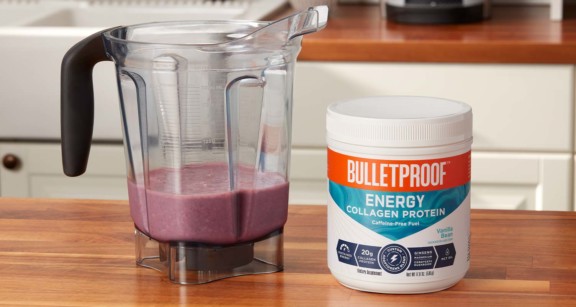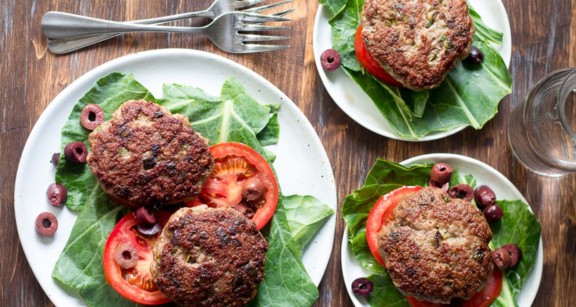Weight Loss
Trends in weight management, from diet to medications, have been coming and going for years. But they haven’t necessarily answered the complex question: how do you maintain a healthy weight for good?
We all know that initial burst of motivation when starting a new diet or fitness plan, but what about the long run? How do you turn those healthy changes into a lifestyle and what are the real benefits of reaching and maintaining a healthy weight?
Determining how to lose weight through a sustainable lifestyle change must be a conscious effort. There’s no magic pill or potion to get you there. But there are ways you can take charge of your weight through a shift in perception and approach in your daily habits.
Here, we’ll explore why maintaining a healthy weight, the benefits of weight loss, the Bulletproof approach to weight loss, the role of supplements, healthy recipes to try and common FAQs about weight.
When is Weight Loss Important?
Maintaining a healthy weight is not just about looking good. It’s essential for overall well-being and longevity. When you carry excess weight, especially around the abdominal area, it can lead to the accumulation of visceral fat.1 What is visceral fat? It is a type of fat that is stored deep within the abdominal cavity and surrounds vital organs such as the liver, pancreas and intestines.
Excess visceral fat is linked to an increased risk of chronic diseases, including heart disease, type 2 diabetes and hypertension.2 It can produce inflammatory chemicals, contributing to chronic inflammation throughout the body.3 It can lead to insulin resistance, which raises blood sugar levels and may lead to diabetes.4 It also affects liver health and hormonal balance, potentially impacting reproductive health in women.5 Plus, carrying excess weight, especially around the abdomen, can hinder lung function, causing breathing difficulties, especially during physical activity.6
Benefits of Weight Loss to Maintain a Healthy Weight
Reducing the risks associated with visceral fat can have long-lasting benefits to your health. Some include:
Energy
When you carry excess weight, your body expends extra energy just to move around. Shedding excessive weight may reduce this physical strain, leading to increased mobility, reduced fatigue and potentially more stamina.7
Supports Heart Health
Maintaining a healthy weight contributes to better heart health by reducing risk factors like high blood pressure and unhealthy cholesterol levels.8 Additionally, improved insulin sensitivity further reduces the risk of heart-related health concerns.
Mobility Support
Excess weight, especially in the hips, knees and lower back, can lead to discomfort and limited mobility. As you shed extra pounds, the reduced stress in these areas may allow for greater ease of movement and increased overall mobility, making everyday activities and exercise more manageable and enjoyable.9
Longevity
Maintaining a healthy weight can support longevity by reducing the risk of chronic conditions associated with obesity.10 By adopting a healthier lifestyle, you can improve your well-being and potentially extend your lifespan.
The Science-Backed Benefits of Weight Loss
Ongoing scientific research on weight loss continues to explore the benefits of weight loss and maintaining a healthy weight.
Metabolism
Obese patients with Type-2 diabetes can benefit from weight loss, according to a study of 100 patients.11 Researchers observed that with progressive weight loss, patients’ abnormal blood glucose and lipid metabolism improved. This breakthrough adds to the theoretical foundation for future diabetes treatment and education.
Hunger
Another research study on intermittent fasting and weight loss found that participants showed improvements in hunger management after a four-week period.12 Intermittent fasting for two days versus one day per week showed similar results. Other impacts included improvements in body composition and cardiometabolic benefits.
Sleep
And finally, a randomized clinical trial involving 89 obese Spanish men with sleep apnea concluded that weight loss dramatically improved their conditions.13 After participating for two months in the lifestyle intervention program, 45% of participants no longer required CPAP therapy. After six months, this number increased to 62%. Researchers concluded that weight loss contributed to meaningful and sustainable improvements in sleep apnea severity and comorbidities.
The Bulletproof Approach to Weight Loss
The Bulletproof diet is focused on supporting a healthy lifestyle by viewing food as fuel and challenging nutrition norms. The diet advocates using quality fats as energy for your mind and body, with an emphasis on nutritionally dense foods. It also stresses the importance of personalizing your approach to wellness, so you discover what better feels like for you.
What you eat matters but forget about counting calories. The calories in, calories out approach doesn’t take into consideration the nutritional content of food or your relationship with what you eat. By practicing intuitive eating, you can not only feed your body what it needs but improve your approach to eating. The Bulletproof approach is all about supporting a healthy metabolism, helping to keep you fuller longer and fueling your day with the energy you need.
The Bulletproof approach recognizes that with today’s fast-paced life, it can be challenging to hit your health goals with diet alone. One way to complement a healthy lifestyle is with targeted supplements that help address specific needs.
Weight Loss Supplements
Bulletproof offers a range of supplements to support healthy weight management that can help you in your wellness journey. When exploring the different options on the market, consider how different nutrients and stimulants can support your goals.
Caffeine can temporarily boost metabolic rate and increase your energy expenditure, potentially aiding in calorie burning.14 Caffeine may also act as an appetite suppressant, helping you feel less hungry.15 Plus, caffeine can improve exercise performance, which can enhance the effectiveness of physical activity in your weight loss efforts.16 Get your caffeine and metabolic support with our specially formulated High Achiever coffee.
Fiber also plays an important role in shedding pounds. Foods rich in dietary fiber tend to be more filling, reducing your overall calorie intake.17 Secondly, fiber can slow down the digestion and absorption of carbs, leading to more stable blood sugar levels and reduced hunger spikes.18 And finally, a high-fiber diet can promote a healthy gut microbiome, which may influence metabolism and weight regulation positively.19 Looking to add more fiber to your diet? Check out our InnerFuel Prebiotic.
And let’s not forget the importance of protein in weight management. One of its primary benefits is promoting feelings of fullness and reducing appetite, which can help curb mindless snacking.20 Plus, a high-protein diet can help preserve lean muscle mass while promoting fat loss.21 Protein is essential for repairing and building tissues, which comes in handy when your body is breaking down fat stores. Boost your daily dose of protein with Collagen Peptides.
While supplements can play a valuable role in supporting your health journey, they’re not a substitute for the nourishing power of a vibrant, high-quality diet. If you’re exploring avenues to maintain a healthy weight, consult with your healthcare provider for personalized guidance first.
Our Supplement Testing Standards
We develop our supplements with a science-backed approach while only using quality ingredients. We go above and beyond market standards to ensure that our products are effective and safe.
We work with third-party labs because we want all our ingredients and final products to undergo unbiased, objective testing. We develop our supplements through an extensive four-stage testing procedure.
First, we test the identity of the ingredients to make sure they are present in the formula and not diluted. Then, we look for harmful contaminants to ensure the safety of the product. After that, we test for strength to make sure the supplement has the right amount of active ingredients and matches what is declared on the label. The last step involves composition testing to ensure the supplement meets all the label specifications. These testing procedures are necessary to guarantee the safety, efficacy and accuracy of our products.
Recipes for Weight Loss
There are so many delicious recipes to try to help you achieve your wellness goals. Explore some of our top picks here:

10 Low Carb Snacks to Make Today

13 Easy & Delicious Post Workout Smoothie Recipes

Hold the Bun With These Mouthwatering Keto Burger Recipes

30-Minute Paleo Zoodles and Meatballs

Easy Keto Breakfast Recipes With 10 Carbs or Less

Paleo Cauliflower Rice Sushi Rolls

Creamy Cauliflower, Collagen and Chicken Soup

Easy Baked Tandoori Salmon With Cauliflower Rice
Learn More About Weight Loss
Weight Loss Articles
How to Lose Weight and Stick to Your Diet This Year
Why You’re Not Losing Weight on the CICO Diet
Gained Weight on the Paleo Diet? Here’s What Went Wrong.
Celery Juice Is the Latest Gut Health Trend — But Should You Try It?
Gut Bacteria and Weight Management: What You Need to Know
The One Big Mistake Weight Watchers Made for 14 Years!
Intuitive Eating: How to Lose Weight By Listening to Your Body
Weight Management Supplements That Actually Work
The Best Ways to Stay at a Healthy Weight, According to Science
9 Reasons You’re Not Losing Weight on Keto And How to Get Back on Track
7 Ways to Avoid Winter Weight Gain, According to Experts
How to Maintain Weight on the Bulletproof Diet
Go Low-Carb to Burn More Calories and Manage Weight, According to Study
How to Deal With Visceral Fat, and Why It’s So Bad for You
The Truth About Metabolism-Boosting Foods, According to Experts
It’s NOT The Calories – Quality is What Counts
Does Intermittent Fasting Help With Your Weight? What You Should Know
The Truth About Fad Diets and What to Do Instead
Rooibos Tea Benefits Weight Management, Plus 9 Other Reasons to Drink It
A Low-Carb Diet Helps Shed Body Fat, Even if the Scale Doesn’t Change
Recipes to Support Healthy Weight Management
Carbonara Zoodles With Crispy Bacon & Sage
Break Your Intermittent Fast With These 19 OMAD Recipes
Bacon Mashed Cauliflower Recipe
Whole Roasted Cauliflower With Chimichurri Sauce
Low-Carb Dumpling Cabbage Wraps with Black Vinaigrette
The Bulletproof Tea Guide: How to Make a Killer Cup of Tea
15 Sweet Keto Smoothie Recipes to Power Your Day
Low-Carb Coffee Smoothie Recipes to Give Your Morning a Boost
FAQs
BMI, or Body Mass Index, is a numerical value used to estimate your overall body fat based on your weight and height. It provides a rough indicator of whether you have a healthy weight for your height. While it’s a useful tool for assessing weight-related health risks, it doesn’t directly measure body fat percentage or consider factors like muscle mass, bone density and body composition. To calculate your BMI, you can use the following formula: BMI = (weight in kilograms) / (height in meters).
The “best” weight loss diet is highly subjective and can vary from person to person. What works well for one individual may not be as effective or suitable for you. It’s crucial to consider your specific dietary preferences, lifestyle and any underlying health conditions when choosing a weight loss diet. At Bulletproof, we emphasize eating high-fat and high-protein foods while minimizing carb intake. We also discourage the “calorie in, calorie out” approach which does not consider the nutrients in food, only the calories you consume and burn. We promote healthy eating habits and sustainable lifestyle changes for lasting weight management.
If you’ve hit a weight loss plateau, don’t despair. There are many reasons you’re no longer losing weight. For example, it’s possible that your body is not in ketosis after all. Another reason could be you’re eating too much or not eating enough. Or your macros could not be optimal for your needs. Check out our article 9 Reasons You’re Not Losing Weight on Keto & What to Do About It.
Start by setting realistic and achievable goals. Break your larger weight loss goal into smaller, more manageable milestones, allowing you to celebrate your achievements along the way. Keep a journal to track your progress, including your food intake, exercise routines and how you feel physically and emotionally. Celebrate non-scale victories like increased energy, improved fitness and better sleep to stay positive and motivated. And finally, surround yourself with a support system, whether it’s friends, family or a weight loss group, to provide encouragement and accountability.
Yes. The key lies in moderation and balance. Instead of eliminating your favorite treats, incorporate them into your diet mindfully and sensibly. Savor your favorite foods in smaller amounts. Planning ahead can also help. Occasional treats are a normal part of a healthy lifestyle and enjoying them in moderation can make your weight loss journey more sustainable and enjoyable.